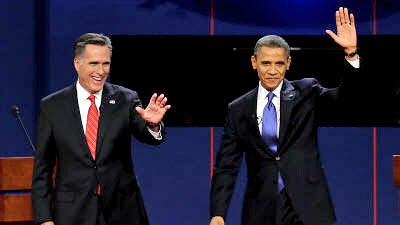
by John Cook
October 15, 2012
from
Gawker Website

Time's
Mark Halperin has made himself useful for once by obtaining, and
publishing,
a copy of the 21-page memorandum of understanding that the Obama and
Romney campaigns negotiated with the Commission on Presidential Debates
establishing the rules governing this month's presidential and vice
presidential face-offs.
The upshot:
Both campaigns are terrified at
anything even remotely spontaneous happening.
They aren't permitted to ask each other
questions, propose pledges to each other, or walk outside a "predesignated
area."
And for the town-hall-style debate tomorrow
night, the audience members posing questions aren't allowed to ask
follow-ups (their mics will be cut off as soon as they get their questions
out).
Nor will moderator Candy Crowley.
Most bizarrely, given the way the debates
have played out, the rules actually appear to forbid television coverage
from showing reaction shots of the candidates:
"To the best of the Commission's
abilities, there will be no TV cut-aways to any candidate who is not
responding to a question while another candidate is answering a
question or to a candidate who is not giving a closing statement
while another candidate is doing so."
The "best of the Commission's abilities"
must be rather feeble, seeing as how almost every moment of the two
debates so far was televised in split-screen, clearly showing shots of
a,
"candidate who is not responding to a
question while another candidate is answering a question."
Which means some of the rules below that both
campaigns stipulated to in a desperate attempt to wring any
serendipity out of the events may be honored in the breach:
-
"The candidates may not ask each other
direct questions during any of the four debates."
-
"The candidates shall not address each
other with proposed pledges."
-
"At no time during the October 3 First
Presidential debate shall either candidate move from his designated
area behind the respective podium."
-
For the October 16 town-hall-style
debate, "the moderator will not ask follow-up questions or comment
on either the questions asked by the audience or the answers of the
candidates during the debate..."
-
"The audience members shall not ask
follow-up questions or otherwise participate in the extended
discussion, and the audience member's microphone shall be turned off
after he or she completes asking the questions."
-
"[T]he Commission shall take appropriate
steps to cut-off the microphone of any...audience member who
attempts to pose any question or statement different than that
previously posed to the moderator for review."
-
"No candidate may reference or cite any
specific individual sitting in a debate audience (other than family
members) at any time during a debate."
-
For the town-hall debate: "Each
candidate may move about in a pre-designated area, as proposed by
the Commission and approved by each campaign, and may not leave that
area while the debate is underway."
Here's the
full document.
Leaked Debate Agreement Shows Both...
Obama and Romney are Sniveling Cowards
October 17, 2012
from
LibertyCrier Website
According to
Time Magazine:
In a rare example
of political unity, both the Romney and Obama campaigns have expressed
concern to the Commission on Presidential Debates about how the moderator of
this Tuesday’s town hall has publicly described her role, TIME has learned.
While an
early-October memorandum of understanding between the Obama and Romney
campaigns suggests that CNN’s Candy Crowley would play a limited role
in the Tuesday-night session, Crowley, who is not a party to that agreement,
has done a series of interviews on her network in which she has suggested
that she will assume a broader set of responsibilities.
As Crowley put it
last week,
“Once the
table is kind of set by the town-hall questioner, there is then time for
me to say, ‘Hey, wait a second, what about X, Y, Z?’”
The agreement was signed on the day of the first
presidential debate, October 3, and neither the Commission on Presidential
Debates nor the debate moderators were parties to the agreement.
The full document obtained by Time Magazine is
shown at the bottom and some highlights from it are:
-
What
would happen if another candidate qualified for the debates.
-
The
candidates agreed not to publicly call for any additional debates
beyond the Commission-sponsored events.
-
Candidates aren’t allowed to cite anyone in the audience (besides
family members) during the debate.
-
Candidates aren’t allowed to address questions to each other or ask
the other candidate to take a pledge.
-
The
moderators can’t do “show of hands” questions.
Apparently both campaigns are terrified at
anything even remotely spontaneous happening and that is the reason why they
need to orchestrate their appearance on stage.
Sources say both
campaigns are preparing their candidates for the debate under the assumption
that Crowley might play a bigger role than either they or the commission
want.
At the same time,
some officials familiar with the deliberations of the campaigns say they
hope that by publicizing the expectations for the moderator’s role in the
town hall and making public the language in the memo, Crowley will be less
likely to overstep their interpretation of her role.
One key source
expressed confidence on Sunday afternoon that, despite Crowley’s remarks on
CNN, the moderator would perform on Tuesday night according to the rules
agreed to by the two campaigns.

